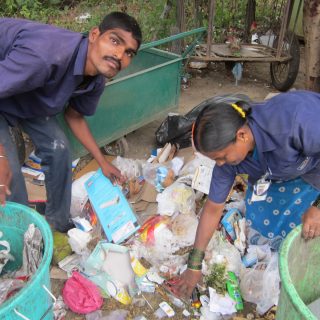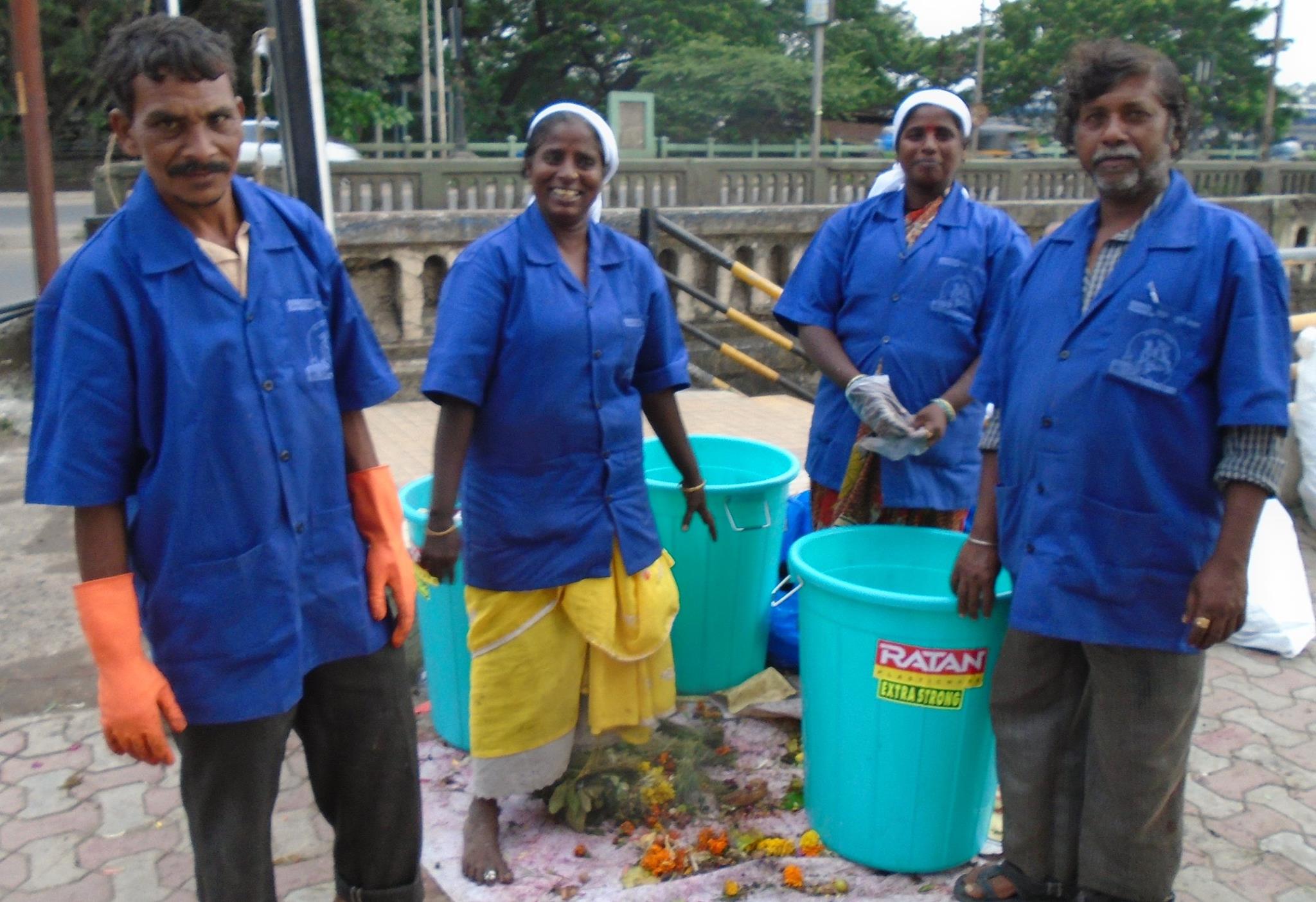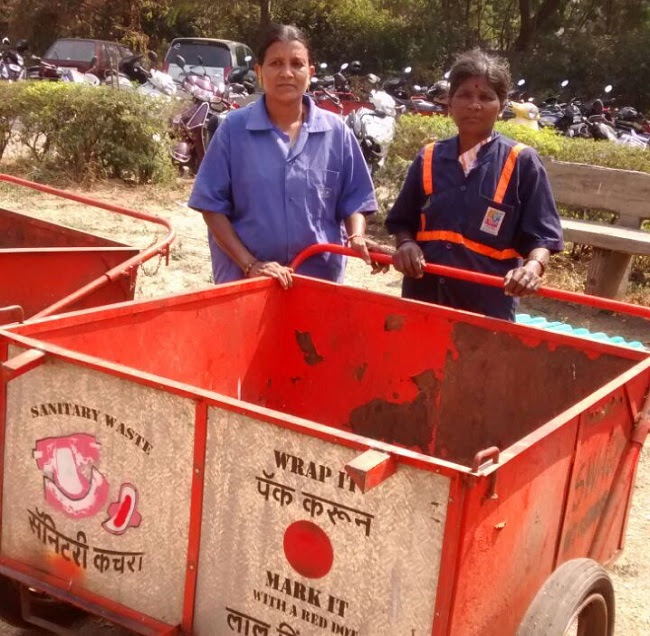Worried about sanitary waste? A waste picker shares the right way to discard it
“Think about how we feel when we sit down to eat our lunch or even cook a meal for our family. We use the same hands to segregate your waste and then to eat and cook. Would you be able to handle it?”

Have you ever met the person who cleans up garbage in your building or clears it from your street corner? Ever stopped to have a conversation with the waste picker?
On a related note, have you ever wondered what happens to your used sanitary pads once you throw them in the garbage?
I had never done this until I sat down to write this article. And I hope this article pushes you into sitting up and thinking about the job that these waste pickers do, day in and day out.
Meet Sarru Waghmare, a member of the Solid Waste Collecting and Handling (SWaCh), India’s first wholly-owned cooperative of self-employed waste collectors and other urban poor based in Pune.
She has been a waste picker since she was a little girl and is today a grandmother. Speaking to The Better India she tells us about how her day typically is, what her job entails, and the perils of being a waste picker.
Sarru knows that this is her job and she does it to the best of her ability. Her biggest and perhaps only grouse is the lack of empathy people have towards her work.
She says, “Everyone looks down upon us. No one wants to make eye-contact or even greet us. Imagine if we all stopped collecting your garbage, would you be able to live?”

On average SWaCH collects and processes over 650 tons of waste in from Pune alone. For recycling it, waste pickers have to process it with a fine toothcomb and open every package so that they do not end up with mixed waste.
Typically, Sarru leaves her house at 6 am, all ready for the day ahead. Do remember that before she sets out, she has cooked and cleaned her own house so that when the others wake up everything is in place for them.
Between 7:00 a.m. to 1:00 p.m. – She goes door-to-door in her assigned area to collect garbage. In some houses, she climbs up three floors to collect the garbage, and in some others, she is made to wait before the trash is collected and handed over to her.
Would you believe it if I said that each day, a pair of waste pickers together go to 500 houses to collect garbage? Sarru tells me that SWaCH covers almost 4.5 lakh houses in a day.

At around 1:00 p.m. she has her lunch with her fellow workers. When I asked her what she eats, she says, “I do not have time to pack lunch for myself in the morning, so typically I eat a vada pav or bhaji pav. In fact on some days, we do not even do that because being amidst so much garbage all day long, our hunger just vanishes.”
Back to work after lunch, between 2:00 p.m.to 5:00 p.m. all the garbage collected from the morning is segregated into various piles.
In collaboration with Aakar Innovations, The Better India is setting up a sanitary pad manufacturing unit in Ajmer, Rajasthan, that will not only produce eco-friendly or biodegradable sanitary pads, but will also employ women from rural communities around the area.
Contribute for the campaign here.
Unable to view the above button? Click here
At 6:00 p.m. her work day ends, and it takes Sarru about 45 minutes to walk back to her place of residence. She returns home to cook and clean yet again.
Sarru talks about some of the things that she and her colleagues have to endure every day. “When we are on the job and are sorting through piles and piles of garbage, having to open a packet with a blood-soaked sanitary napkin is extremely disturbing. It’s not just the sight of it which is bad. But the infection and diseases that we are prone to because of the insensitivity of someone pains me.”
Being exposed to the harmful pathogens from such waste makes these pickers prone to diseases like Hepatitis, E Coli, and Typhoid.

“Think about how we feel when we sit down to eat our lunch or even cook a meal for our family. We use the same hands to segregate your waste and then to eat and cook. Would you be able to handle it?” Sarru asks me pointedly.
The Red Dot campaign was born from this need to sensitise people and make them aware. The campaign is aimed at improving the way resident’s dispose of their sanitary waste. Women are being requested to securely wrap their sanitary waste in a newspaper and mark it with a red dot. Speaking about this, Suchismita Pai, outreach manager at the organisation, says, “Opening sanitary waste is disgusting, and an assault on their dignity and health.”
Speaking to Sarru made me realise how just by being a little of mindful of our actions, we could make the job of the waste pickers so much better. All they are urging us to do is wrap the soiled sanitary napkin in a newspaper and make or stick a big red dot on it. When the waste pickers see this, they know what is inside and can segregate it accordingly.
Let’s pledge our support in ensuring that we do our bit and mark our sanitary waste with a red dot henceforth.
Photo credits: SWaCH Facebook page
In collaboration with Aakar Innovations, The Better India is setting up a sanitary pad manufacturing unit in Ajmer, Rajasthan, that will not only produce eco-friendly or biodegradable sanitary pads, but will also employ women from rural communities around the area.
Contribute for the campaign here.
Unable to view the above button? Click here
Like this story? Or have something to share?
Write to us: [email protected]
Connect with us on Facebook and Twitter.
NEW: Click here to get positive news on WhatsApp!

Similar Story

Pune Data Scientist Grows a Mini Forest With Over 500 Plants In Her Balcony
There was a point where Manasi Danukhe, a data scientist from Pune, didn’t even know how to plant a sapling. Today, her mini forest at home is replete with all kids of plants, ferns, flowers, and more. Here are some tips on how she did it.
Read more >
If you found our stories insightful, informative, or even just enjoyable, we invite you to consider making a voluntary payment to support the work we do at The Better India. Your contribution helps us continue producing quality content that educates, inspires, and drives positive change.
Choose one of the payment options below for your contribution-
By paying for the stories you value, you directly contribute to sustaining our efforts focused on making a difference in the world. Together, let's ensure that impactful stories continue to be told and shared, enriching lives and communities alike.
Thank you for your support. Here are some frequently asked questions you might find helpful to know why you are contributing?


This story made me
-
97
-
121
-
89
-
167












